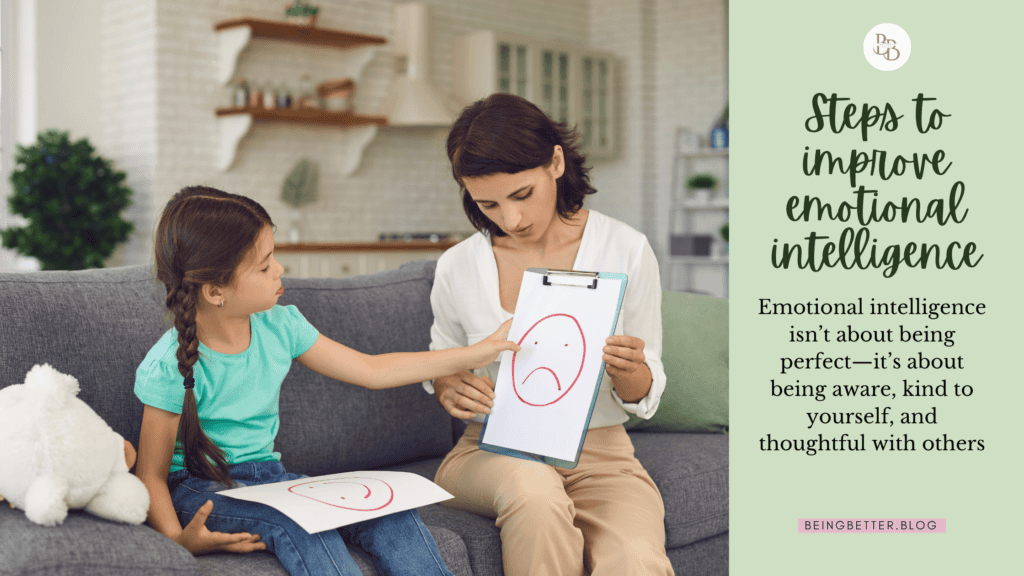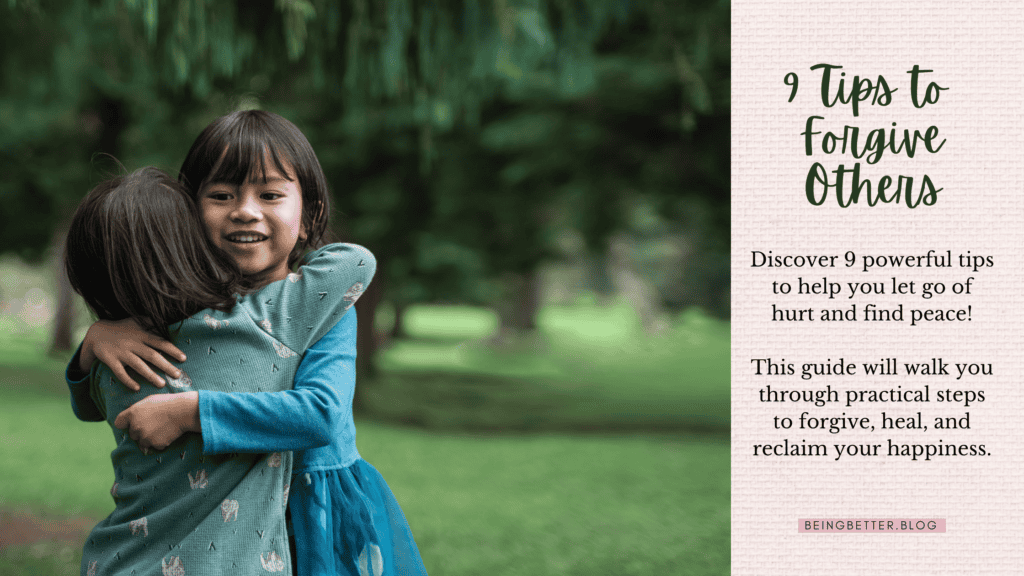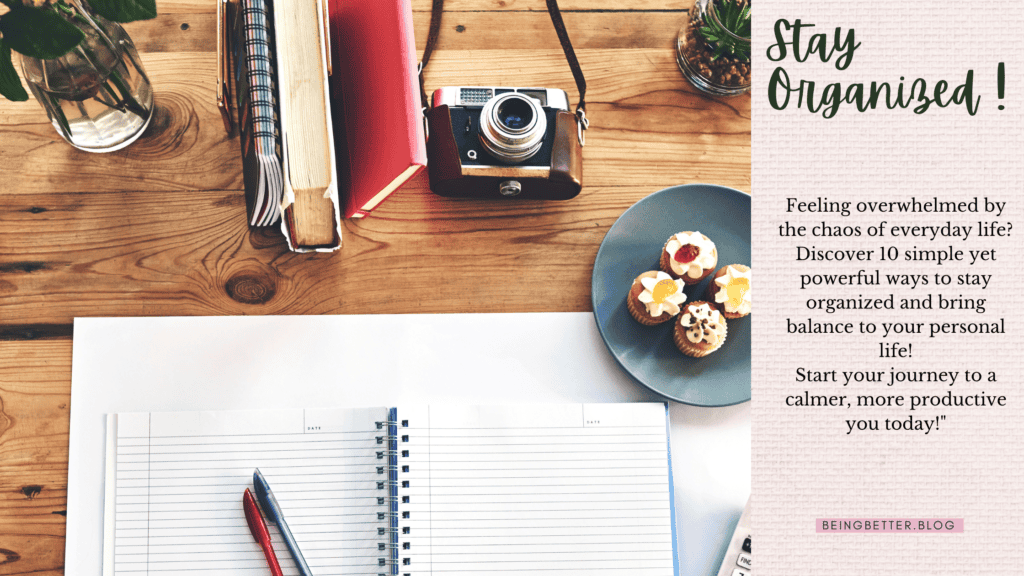Table of Contents
Emotional Intelligence: Everything I Know!
So have you ever just known what someone was feeling without them saying a word? Like, their face was calm, but something in your gut said, “Nope, they’re definitely upset.” Or maybe you were this close to snapping at someone, but instead, you took a deep breath and let it go.
That right there—that’s emotional intelligence (EI).
And honestly? It’s way more powerful than we often give it credit for.
So, What Actually is Emotional Intelligence?
In the simplest terms, it’s your ability to understand your own emotions and notice what others are feeling, too.
It’s about being emotionally aware.
For me, emotional intelligence felt like unlocking a superpower I never knew I had. The more I practiced it, the more I realized—this changes everything.
Why does it even matter?
Because emotions are everywhere. In how we talk, listen, decide, argue, apologize, love… You name it.
Emotional intelligence helps you:
- Stay cool in stressful moments
- Communicate without turning things into drama
- Make decisions that feel right, not just urgent
- Build deeper, realer relationships (not just surface-level connections)
Why I’m Talking About Emotional Intelligence
Because I wish someone had talked to me about it earlier.
For a long time, I didn’t even know emotional intelligence was “a thing.” I just knew I felt everything deeply—sometimes too deeply—and I couldn’t always explain why I reacted the way I did. One little comment could ruin my day. One misunderstanding could leave me overthinking for hours. And bottling it up? That only made things worse.
I used to think I was just “too sensitive” or “bad at handling pressure.” But once I discovered emotional intelligence, everything started making sense.
It’s like someone handed me a map of my inner world. I began understanding my triggers, calming myself down without guilt, and connecting with people in a way that felt real—not forced. And you know what? Life didn’t feel so chaotic anymore.
I’m sharing this because I know how hard it can be to feel overwhelmed by your own emotions or to feel misunderstood by others. EI gave me clarity, calm, and confidence. And I believe everyone deserves to feel that kind of peace in their everyday life.
Whether you’re navigating tough relationships, managing stress, dealing with self-doubt, or just trying to grow, emotional intelligence is the soft skill that quietly transforms it all.
That’s why I’m talking about it.
Because it helped me.
And maybe… it might help you too. ❤️
How Acquiring Emotional Intelligence Changed My Life
- I stopped reacting and started responding.
Before EI, even a small comment could ruin my whole mood. I’d either lash out or go silent for hours. Now, I pause, breathe, and ask myself, “What do I really want to say here?” That little moment of pause changed everything. - I began naming my emotions instead of drowning in them.
I used to say “I’m fine” even when I was clearly not. But now, I can say, “I feel a little anxious” or “I’m overwhelmed.” Naming my feelings helped me feel lighter, like I was finally being honest with myself. - I learned to sit with my emotions, not run from them.
When sadness or anger showed up, my first instinct used to be distraction—TV, scrolling, snacking. But EI taught me that it’s okay to feel things fully. I now give myself permission to cry, to rest, to just be. - I started understanding why I overthink and found peace in the process.
Overthinking used to keep me up at night. But once I began understanding the emotions underneath (usually fear or self-doubt), I became kinder to myself. It wasn’t about fixing everything—it was about giving myself grace. - I became aware of my emotional triggers.
Certain tones, certain words, or even a delay in a text used to throw me off emotionally. Now I notice those triggers and explore where they come from. This awareness helped me break old emotional patterns that no longer serve me. - I finally stopped bottling things up.
There was a time I thought, “If I speak up, it’ll cause drama.” But all it did was create silent suffering. Emotional intelligence taught me that expressing feelings with honesty and care is not conflict—it’s connection. - I forgave myself for past mistakes, and that lifted a lifelong weight.
Carrying guilt used to feel like dragging invisible chains. But once I understood my emotions and where they came from, I could look back at my past self with compassion, not judgment. - I became emotionally available to the people I love.
Before, I’d shut down emotionally when someone else was hurting because I didn’t know how to deal with their pain. Now I say, “I may not have the right words, but I’m here with you.” That changed how I show up for others. - I stopped taking everything personally.
Not everything is about me—and emotional intelligence helped me really understand that. Now, I can separate someone’s mood or behavior from my self-worth. What a relief that is. - I found beauty in being vulnerable.
I used to see vulnerability as weakness. But now, sharing my true feelings, fears, and dreams feels like the most authentic, powerful thing I can do. It opened up deeper connections with people I love—and even strangers. - I communicate better and more gently.
I don’t just speak my mind anymore; I speak with awareness. I think about how my words will land. I’ve become better at saying hard things without hurting people. That took practice, but it’s so worth it. - I started journaling, and it changed how I process emotions.
Writing my feelings down helps me organize the chaos in my mind. It became my safe space to process without judgment. Some of my most healing moments started with a pen and paper. - I gained more emotional energy and lost less of myself.
When I stopped being reactive and overly apologetic, I saved so much emotional energy. I could redirect that toward healing, creating, and doing things I love instead of overanalyzing every little thing. - I became a better decision-maker.
I used to make choices out of fear or urgency. Now, I ask: “What do I feel? What do I need?” Emotional clarity brought more confident, peaceful decision-making. - I accepted that not every emotion needs a solution.
Sometimes, I just sit with my feelings and let them pass through like waves. That acceptance brought me peace. Not every low day needs fixing. Some just need love and rest. - I gave myself permission to change.
EI helped me realize that who I was 5 years ago—or even yesterday—is allowed to grow, evolve, and outgrow. I stopped punishing myself for changing. I started celebrating it. - I now set boundaries from a place of love, not fear.
Boundaries used to feel like walls. But emotional intelligence helped me build them like fences, with gates that open and close lovingly. It’s not rejection—it’s self-respect. - I became gentler with others, too.
Once I understood that I had wounds, I realized others do, too. Even the grumpy cashier, the rude co-worker, the friend who suddenly pulls away—everyone’s carrying something. That helped me choose compassion more often. - I stopped needing to “fix” everything right away.
Sometimes, emotions just need space. I no longer jump to fix others or myself in uncomfortable moments. I just breathe, stay present, and allow the messiness to unfold gently. - I now feel emotionally free, not emotionally controlled.
I still have tough days, of course. But they don’t own me anymore. I move through them with awareness, not fear. That emotional freedom is one of the greatest gifts EI has ever given me.
Different steps to become emotionally intelligent (from my personal experience)
Growing emotional intelligence isn’t about being perfect or hiding your emotions. It’s about understanding them, handling them in a healthy way, and connecting better with yourself and others. Let’s break it down—step by step—with actions you can start today-Which made me who I am today!
Step 1: Build Self-Awareness
Self-awareness is like getting to know yourself on a deeper level. It’s not just about knowing you’re “angry” or “happy,” but why you’re feeling that way. It’s like becoming your own best friend—the kind who gently points out when you’re acting out of stress, fear, or maybe even hunger! When you’re self-aware, you can catch emotional patterns, understand your moods better, and stop yourself from going into autopilot reactions. It’s the first step to taking control of your emotional world instead of being controlled by it.
- Pause and check in with yourself: Ask, “What am I feeling right now?”—sad, frustrated, excited? Naming your emotion helps you understand it.
- Keep an emotion journal: Write down your feelings daily. Include what triggered them and how you reacted.
- Notice your body signals: Tension in shoulders? Racing heartbeat? These can be clues to hidden emotions like stress or anger.
- Ask yourself deeper questions:
- Why did I react that way?
- Was there something else bothering me?
Use a mood tracker app or a printable journal page to make it a habit.
- Why did I react that way?
Step 2: Practice Self-Regulation
Self-regulation is your inner emotional brakes. It’s that magical pause button between what you feel and how you react. You’re not pretending to be okay when you’re not, but instead choosing how to express your emotions without letting them explode or cause damage. It’s not about suppressing anger or sadness—it’s about channeling them in healthy, helpful ways. And let’s be honest—we all have moments when we say or do something in the heat of the moment and regret it later. Learning to regulate helps reduce those moments big time.
- Breathe before reacting: Count to 5 slowly or take deep breaths when you’re triggered.(This helped me to control my emotions and unwanted reactions to a large extent.)
- Create a “pause plan”: When emotions rise, step away, go for a walk, or write in your journal before speaking or acting.
- Practice calming activities: Try meditation, yoga, or just sitting quietly with a cup of tea.
- Label your triggers: Know what typically upsets or overwhelms you so you can prepare ahead.
- Choose your response: Ask, “What’s the most helpful way to deal with this?” instead of reacting impulsively.
Step 3: Strengthen Internal Motivation
This one’s about what drives you from within. Not applause, not likes on a post, not someone else telling you you’re “doing great.” It’s that quiet fire in your heart that keeps you going even when no one’s watching. Emotionally intelligent people stay motivated because they’re deeply connected to their own values, goals, and dreams. They know what matters to them, and they keep showing up—especially when life throws curveballs. Growing this kind of motivation gives you resilience, purpose, and a beautiful kind of independence.
- Identify your “why”: Why do you want to improve, grow, or succeed? Write it down and revisit it often.
- Set small, meaningful goals: Break big dreams into steps you can accomplish this week.
- Celebrate your progress: Even small wins matter. Acknowledge them! And give yourself little rewards!
- Bounce back from setbacks: See failures as lessons. Ask, “What did I learn from this?”
- Stay connected to your values: Are you living in a way that feels true to you? If not, what needs to shift?
You’re not doing this for applause. You’re doing it for a better you.
Step 4: Develop Empathy
Empathy is the art of truly seeing someone, feeling with them instead of just looking from the outside. It’s what helps us build stronger connections, avoid misunderstandings, and be there for people in a meaningful way. It’s not always about fixing or giving advice. Sometimes, it’s just saying, “I hear you, and I’m here.” Empathy also softens our judgments—we begin to understand that people’s actions often come from pain, fear, or insecurity. The more we build empathy, the more compassionate and kind the world becomes, starting with us.
- Listen to understand, not to reply: Let people finish speaking. Focus on how they say things, not just the words.
- Put yourself in their shoes: Ask, “How would I feel if I were them right now?”
- Be curious, not judgmental: Try to understand why someone acted a certain way, especially during conflict.
- Validate feelings: Even if you don’t agree, you can say, “That sounds really hard” or “I get why you’d feel that way.”
- Read or watch stories from different lives: Books, interviews, or documentaries about others’ experiences build your emotional world.
Step 5: Improve Social Skills
Social skills are more than just being “talkative” or “friendly.” They’re about knowing how to connect, how to speak so people really hear you, and how to listen so people feel safe and seen. It’s also about understanding the little unspoken things—like when someone needs space or a warm smile. Good social skills help you navigate tricky conversations, work with others peacefully, and build relationships that actually feel good. You don’t have to be the loudest person in the room—you just need to be someone who listens, respects, and communicates with heart.
- Practice active listening: Make eye contact, nod, and repeat what someone says to show you’re listening.
- Use “I” statements during conflict:
- Instead of “You always ignore me,” say “I feel unheard when you don’t respond.”
- Instead of “You always ignore me,” say “I feel unheard when you don’t respond.”
- Express appreciation often: Say thank you, give compliments, or acknowledge someone’s efforts.
- Watch your tone and body language: They say more than your words.
- Learn to set boundaries kindly:
- Example: “I need some quiet time right now, can we talk later?”
Good relationships are built on clear communication and respect, not perfection.
- Example: “I need some quiet time right now, can we talk later?”
Emotional intelligence isn’t about being perfect—it’s about being aware, kind to yourself, and thoughtful with others. It’s a quiet strength that can truly change how you experience life.
Start small. Tune in. Take a breath. Reflect.
Bit by bit, you’ll build a deeper connection with yourself and the people around you. And trust me, that changes everything.



